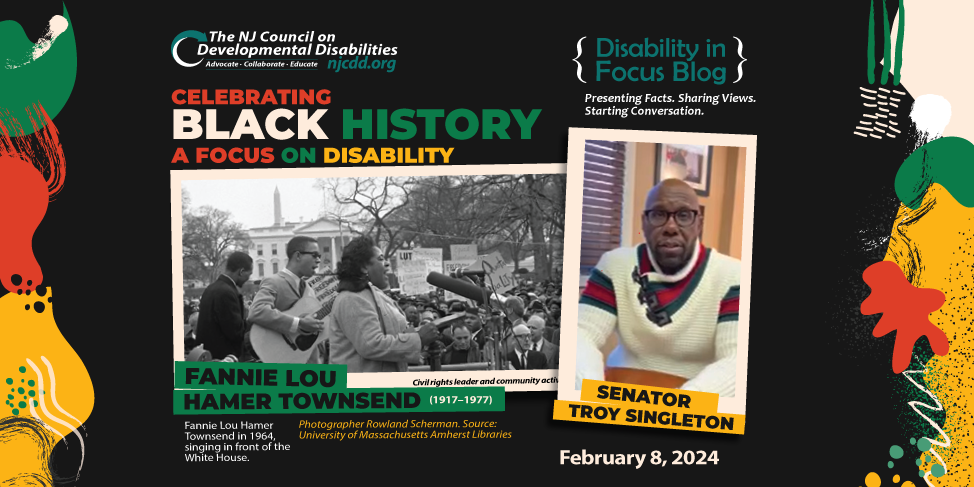Thank you to New Jersey Senator Troy Singleton, an active and founding member of the New Jersey Legislative Disability Caucus and strong supporter of NJCDD’s advocacy work, who shared this message celebrating Black History Month.
We join the Senator in saluting all who are committed to making the world more equitable and fully inclusive. We share his vision of opportunity for everyone to explore their potential and use their talents to make society a better place.

Throughout Black History Month, we celebrate the contributions of Black Americans with disabilities who made a significant impact on our world. This week, we highlight the work of civil rights advocate Fannie Lou Hamer Townsend.
Fannie Lou Hamer Townsend (1917–1977), was a civil rights leader and community activist. She promoted voting rights and employment/economic opportunities for Black Americans. She was also a co-founder of the National Women’s Political Caucus, an organization created to recruit, train, and support women of all races who wish to seek election to government office.
Throughout her career as an advocate, she was threatened, harassed, shot at, and assaulted while trying to register for and exercise her right to vote. She helped and encouraged thousands of African Americans in Mississippi to become registered voters.
Twice she ran for political office: In 1964, she made a bid for the US Senate; and in 1971, she ran for the Mississippi State Senate.
Fannie Lou Hamer Townsend had polio as a child and experienced permanent injury as a result of being beaten when arrested for her activism.
Did You Know:
Through our 5-Year State Plan, the NJCDD has prioritized outreach and education efforts aimed at better supporting New Jersey’s Black I/DD community. In forming that 5-Year State Plan, the NJCDD Chairperson, Paul Blaustein appointed an ad hoc committee on diversity, equity and inclusion to help inform the Council’s efforts. Now, through that plan, NJCDD is funding projects and engaging in outreach designed to ensure increased levels of diversity, equity, cultural competency, and linguistic responsiveness in all aspects of the work carried out by the Council, and its staff. One of our objectives focuses on building collaborations and coalitions designed to reduce barriers to service access and delivery, with an emphasis on reducing inequities experienced by historically underserved populations, including individuals who are Black. Learn more about our state plan, click here: https://njcdd.org/njcdd-5-year-planning-2022-2026/
.







